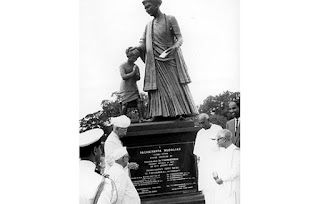 |
| Philanthropist Pachaiyappa Madras. wikiwand.com |
 |
| Pachaiyappa mudaliar. istampgallery.com |
 |
| Philanthropist Pachaiyappa Madras. cknc.edu.in |
Born in 1754 in a poor family at Periyapalayam village of Thanjavur district, life was not easy for young Pachaiappa because he lost his father before his birth. At a young age along with his mother Punchi Ammal, he moved over to Black Town (now called George town), Madras where they were helped by Dubash Narayana Pillai who had contact with the EIC officials. His mother got a job and Narayana Pillai put Pachaiyappa in a school. Over a period of time, young Pachaiappa picked up a fair knowledge English - enough to work in the English family.
Being a patron of Chidambaram Nataraja temple, he made big donations and jewelry to the temple.. His big house was always active offering free food to a large number of people. Though very wealthy, till his death he remained humane and humility and gratitude were his hallmarks. He never forgot his mentor to whom he owed a debt of gratitude and got his son a job with Joseph Sullivan Co. Apart, he made him his agent in Madras and all transactions had to be made through him.
 |
| Quote from US Prez. George Bush. classy.org/ |
Having suffered a paralysis for his continuous hard work, he wrote a Will dated 27 March 1794. Being religious, in the ''Will'' he allocated enough funds to conduct nithya puja at certain temples across India including Kashi and Rameswaram. On 31 March 1794 during his visit Thiruvaiyaru he passed away at the age of just 40 leaving behind him a legacy of good deeds, charities and lot of admirers.
Though some amount of money was lost due to financial mismanagement by the successors, some funds were redeemed and set aside in the charities to run the educational institution, etc. It was done through the colonial court. One of the famous being the famous institutions Pachaiyappa college of Chennai which began as a school.
The trust made by Pachiyappa was under litigation for decades with no solution in sight. I believe in the 1990s the court case came to an end. It is said the trust was worth over several billion rupees and is one of the biggest in India. The trust is taking care of many religious charities from Kanyakumari to Varanasi, as many as six colleges, a polytechnic and 16 schools in Tamil Nadu. Besides, it owns many properties across the state.
A protégé of Dubash Narayana Pillai, Late Pachaiappa's contribution to Madras was vast.
https://www.wikiwand.com/en/Pachaiyappa_Mudaliar
https://en.wikipedia.org/wiki/Pachaiyappa_Mudaliar
https://chennai.citizenmatters.in/kolkata-chennai-heritage-v-sriram-rajaji-hall-6895








.jpeg)
